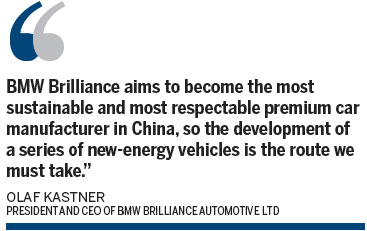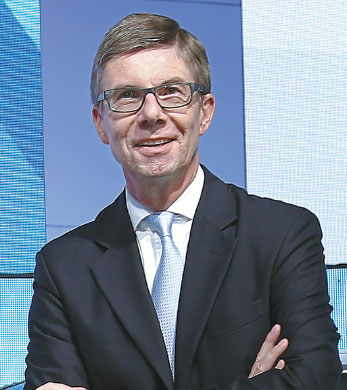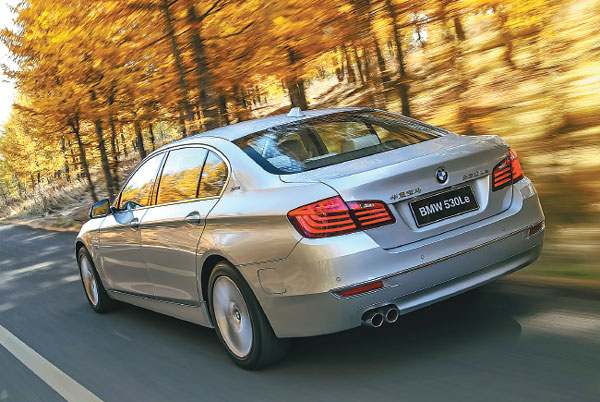Sustainability the mission for BMW Brilliance
BMW Brilliance has made sustainability the top value throughout its overall operations, including manufacturing and product development.
Last week, the joint venture of BMW AG made the global debut of the BMW 530Le at the Guangzhou auto show, which it said is the first plug-in hybrid business sedan combining luxury, comfort, fuel efficiency and environmental friendliness.
"BMW strongly believes that future luxury in the automobile industry will be defined by innovation and sustainability," said Olaf Kastner, president and CEO of BMW Brilliance Automotive Ltd.
"This car we tailor-made for Chinese customers reinforces BMW's firm commitment to sustainability and providing premium vehicles with high efficiency and low exhaust."
Based on the BMW 5 Series Li, BMW Brilliance self-developed the 530Le with support from BMW's Munich headquarters. It mixes the highly efficient TwinPower Turbo N20 engine with eDrive technologies, providing both zero emission electric drive and long distance transport.
"China is BMW's largest market globally. The birth of BMW 530Le was also significant for the group to reach its fuel consumption and emission reduction target globally," said Kastner. "It sets a new benchmark in fuel efficiency and emission in its segment."
According to Kastner, the 530Le offers lowest fuel consumption of 2.1 liters per 100 km and the lowest CO2 emissions, 49g/km, in its segment.
Planned to officially hit the market early next year, the plug-in hybrid is produced in Shenyang, Liaoning province.
"We are confident that the BMW 530Le will continue BMW 5 Series Li's market recognition and popularity, and help extend the 5 Series lineup and reinforce the family's leadership and competitiveness in China's luxury vehicle market," said Kastner.
BMW eDrive boasts impressive dynamics and is emission free when driven in pure electric mode, with which it has a range of 58 km.
"The 530Le will be a wise choice for modern and progressive business elites between 35 and 45 who keep progressing with the constant changes in the market," said Kastner.
A green vision
"BMW Brilliance aims to become the most sustainable and most respectable premium car manufacturer in China, so the development of new-energy vehicles is the route we must take," said Kastner.
The local joint venture has a clear roadmap in new-energy vehicle development.
In April 2013 BMW Brilliance launched the ZINORO brand, a pure electric tailored especially to the China market. The first model, the ZINORO 1E, was unveiled at the 2013 Guangzhou auto show.
The first ZINORO brand showroom was opened in February in Beijing, with a second scheduled in Shanghai early next year.
In September 2013, BMW Brilliance's new research and development center in Shenyang went into operation, carrying out new-energy development.
Only a year later, the BMW 530Le made its debut in Guangzhou, another milestone for the company.
"BMW is a company that sets clear, long-term strategy for a brighter future. Early in 2002, we has started our EficientDynamics strategy, further developing the potential of the traditional combustion engine (before 2009), then onto electric and hybrid vehicle development until 2020," said Kastner. "The distant and ultimate plan is for hydrogen power."
"Now BMW is an active player in promoting new-energy vehicles with the BMW i3, i8 and the coming 530Le."
An urgent task
The central government views development of new-energy vehicles as an important strategic move for the auto industry to help gain advantages in international competition.
It has called for cumulative production and sales of pure electrics and plug-in hybrids to reach 500,000 units by 2015. And by 2020, it wants production capacity of green vehicles to hit 2 million.
"The plug-in hybrid is one of the best ways to reduce fuel consumption and emissions at this stage, but we are preparing for the mass use of pure electric vehicles with the completion of convenient and widely equipped public and private charging facilities," said Kastner.
BMW was the first premium automaker to push for close cooperation with government departments, the State Grid electric company, real estate developers and research institutes to build charging stations.
It has installed charging poles in Beijing's Sanlitun area and is working with leading real estate developers such as Wanke and Soho for to share charging technologies.
This year, 50 public charging poles were installed in the Shanghai World Expo Pilot Zone that meet the national standard and can provide charging services to BMW i3 and other electric vehicles.
"BMW is pleased to see such a good trend - it shows the growing awareness of new-energy vehicles in China's major cities, not only by the customers, but also by real estate developers and other parties," said Kastner.
ifangfang@chinadaily.com.cn


|
The China-made BMW 530Le ofers lowest fuel consumption of 2.1 liters per 100 km and the lowest CO2 emissions, 49g/km, in its segment. Photos Provided to China Daily |
(China Daily 11/24/2014 page12)









